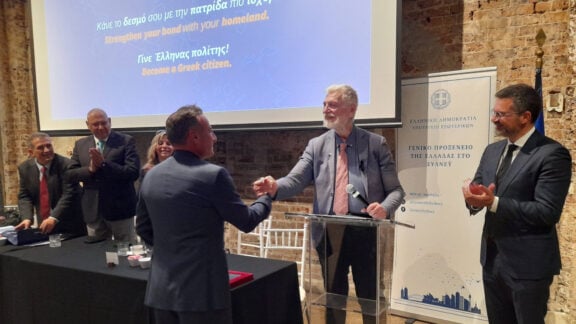Exactly 50 years ago on December 2, 1972, Australia’s future changed forever. The Labor Party won the election after 23 years of conservative government. The campaign simple title It’s Time said it all. The new Prime Minister Gough Whitlam was a watershed for Australia and redefined who we are.
Whitlam and his government woke Australia from it’s slumber, as a nation stuck in the 1950’s. He ushered a new vibrant and modern Australia.
I was not old enough to vote – you had to be at least 21 – but my parents and I knew that if the Conservative Liberal led Coalition had won the elections, I may have been called up to fight for the Australian Army in the Vietnam War.
My dad never allowed me to join the school cadets in fear of me being sent to war in Vietnam, a war he was bitterly opposed to. He had told me that if I did get called up he would send me to Greece. But, we were safe Whitlam within the first week of being elected abolished conscription.
I’m will not list all reforms the Whitlam government introduced – it would take up all this article. But, there was one major measure he introduced and had a profound affect on the working class and migrants, he abolished fees for university.
No longer did you have to be born in wealth to attend university he opened university to everyone. University should not be a privilege but a right. Yet, today university fees runs into the tens of thousands by the time you finish your degree.
Importantly Whitlam changed the way migrants could feel about Australia. He couldn’t stop racism but he did get rid of the long held view that migrants had to assimilate into the Australian way of life and culture. They no longer had o forget their heritage language, and traditions to become ‘fair dinkum Anglo Aussies’ who no longer spoke ‘wog lingo’.
Whitlam introduced multiculturalism as a policy, and was acceptable to maintain the language and customs of your original country of birth, without being frowned upon.
His government reformed radio, introducing ethnic broadcasting stations such as 2EA and 3EA together with giving major increases in grants for the arts, that had been ignored by the previous governments. Whitlam did much to get rid of the cultural cringe, which resulted in talented artists leaving Australia for opportunities. Whitlam encouraged and supported Australian creative industries with the birth of the Australia Council of the Arts.

He lowered the voting age from 21 to 18. It’s time we considered lowering to 16, given one can join the army at 16. He recognised First Nations’ land rights, allowed no-fault divorce and much more. Policies which are still with us. And his most enduring legacy was the creation of a public health system in the form of Medibank, which became Medicare. No conservative has ben able to get rid of our right to public health.
Many may not be Whitlam fans, even Labor voters. It was an exciting and tumultuous period Whitlam like all western nations had to confront the 1970s oil crisis and hyper-inflation. For many years after he was unceremoniously sacked by the Queen’s representative, the Governor General, the Labor Party rarely mentioned him, especially those enamoured with the economic liberalising Bob Hawke and Paul Keating years of the 1980s
Whitlam for many Greek Australians is considered God, he was a philhellene, a student of Greek history, philosophy and art and was the only retired politician to continue attending Greece’s national celebrations of Independence every year on March 25.
No other retired politician has set foot at one of those events as far as I know at least in Sydney, unless they are of Greek origin. Whitlam he continued attending the celebrations outside the Opera house sitting in the sun wearing a hat and leaning on his cane well into his mid 90’s and always received more applause than any other dignitary when his name was announced, he was a real philhellene.
Naturally that Labor government voted in on December 2, 1972 consisted of more than the one major person but it’s up to you to consult the history books and read about the 3 years of that Labor government and their achievements.
No other election date is remembered as much as that of December 2.







